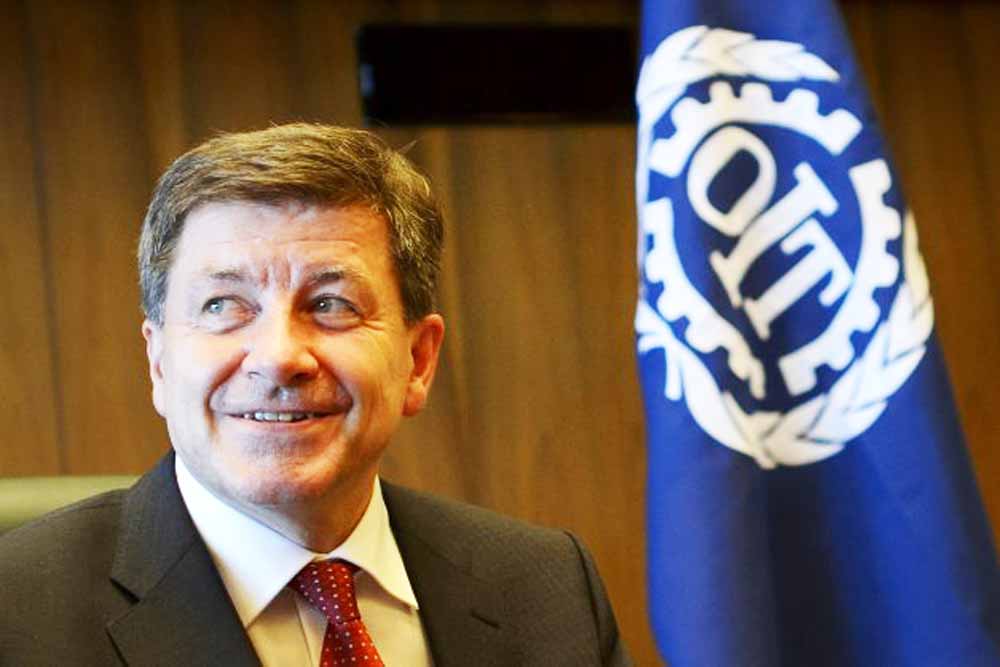
 Guy Ryder, Director-General of ILO
Guy Ryder, Director-General of ILO
ILO is an international institution based in Switzerland. Does it do its job? If its job is to bury the dead (metaphorically speaking) and shelter the abusers, then it's certainly doing a terrific job!
"Since it seems clear that even ILO staff is complaining (the 124th session had about half a dozen such examples), we welcome whistleblowers from ILO itself."This is a subject that we covered here before, but SUEPO (Staff Union of the EPO) has just published more details [PDF], preceded by this introduction which says: "In its 124th session the Tribunal delivered a total of 80 judgments, of which only nine (!) concern the EPO. Of those only two cases were fully reasoned. Both concerned disciplinary sanctions. Six cases, of which 5 coming from the EPO, were summarily dismissed. This paper discusses the latest cases that illustrate the on-going changes in the jurisprudence the Tribunal. We also informs about changes in the composition of the Tribunal and the recent developments in the Appeals Committee."
Here is the text from the concluding part (the PDF is long and contains potentially personal details about complainants):
The insistence on individual complaints not only leads to a lack of regulatory control but also strongly increases the number of complaints to be treated as staff members will have to file complaints for each one of their cases once they are personally affected. The frequent remittals further increase the workload of the EPO and the Tribunal. These also increase the already considerable delays which can be of the order of 4-6 years at the ILO-AT and a similar time internally in the EPO, see e.g. Judgments 3793-3795 in the previous session.
The above list is not complete, but it shows a clear change of direction to the detriment of the complainant. As a consequence only very few EPO cases 28 are judged on the substance and even fewer actually won by staff. In recent years the majority of the EPO cases have been either dismissed as irreceivable or sent back to the Office for one reason of the other. The few EPO cases that have been won by staff members tend to be strictly individual (Judgments 3541, 3781) and have no impact beyond those individual cases. We are not aware of any recent judgments that are favourable to staff as a whole or to a significant part of staff. Although many complaints about Mr Battistelli’s reforms have been filed and have reached the Tribunal, thus far all have been dismissed or sent back on the above grounds.
As indicated above, questions about the Tribunal’s independence have been raised before. The most charitable interpretation of the current developments – including the extremely low number of EPO cases dealt with in the latest session – is that the Tribunal is irritated about what it feels to be an excessive workload coming from the EPO. Should this be the case then the Tribunal apparently blames EPO staff and not the EPO management, as can be seen from Mr Rouiller’s praise for the EPO management (introduction to session 123), his gloating over the Dutch Court case won by the EPO (idem), and the fact that ILO and the Tribunal discuss workload matters with the EPO management but repeatedly refused requests from the staff representation to be involved. Finally, the outcomes of the Judgments speak for themselves.
The current lack of legal guidance will not, however, solve the workload problems of the Tribunal. It does not serve the EPO either: the extreme delays created by the mass remittals lead to long-term legal insecurity, whereas the lack of normative control further frustrates an already frustrated staff. The – by now obvious – collapse of the EPO’s internal justice system and the failure of the Tribunal to provide effective remedies may ultimately lead to the EPO’s immunity in labour matters being lifted. This would probably not be a bad thing for staff. But until then SUEPO will maintain its request for a constructive dialog between the representatives of the Tribunal, the EPO and SUEPO in order to address the current problems.